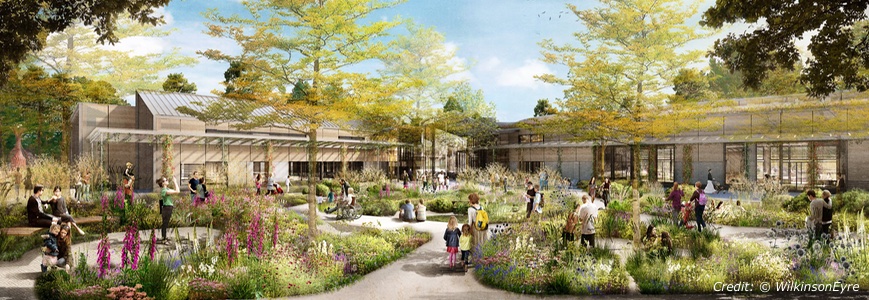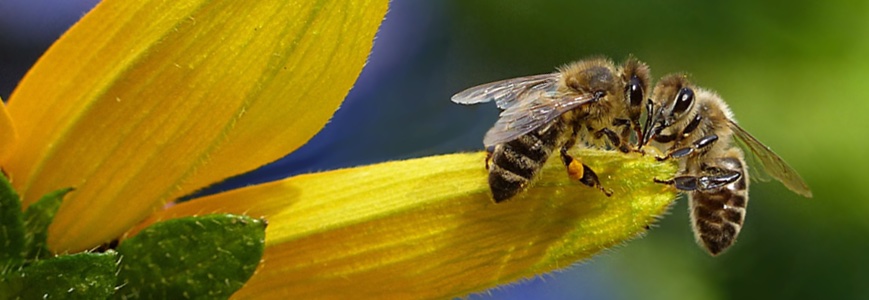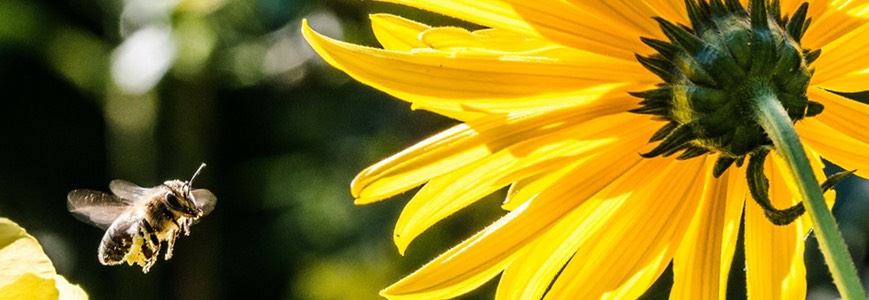THE LANDSCAPING SOLUTIONS BLOG
Welcome to our Blog. Inspiration, updates and industry trends from the team at Landscaping Solutions.
RHS AWARDED £4M NATIONAL LOTTERY GRANT

The Royal Horticultural Society (RHS) announced recently that they have secured a £4 million grant from the National Lottery. The grant money will allow the RHS to construct the world’s first National Centre for Horticultural Science and Learning, as well as develop three new gardens covering 1.2 hectares and restore their current laboratory.
Set to open in 2020, the proposed centre will be constructed at RHS Garden Wisley in Surrey and will feature state-of-the-art research facilities, as well as showcase over one million nationally important science and heritage items for public viewing.
Items such as the Chilean potato plant brought back by Charles Darwin in 1834 (from which our modern potatoes are derived) and lavender collected in France in 1731 are just some of the items that will eventually be showcased.
More than 86,000 herbarium specimens, 24,000 insect specimens, 30,000 pieces of botanical art, 250,000 photographs and 100,000 books charting more than half a millennium of gardening history, will also be moved to the new centre when it opens.
The development of 1.2 hectares surrounding the centre will also see the creation of three new gardens - the Wildlife Garden, the World Food Garden and the Wellbeing Garden. Designed by RHS Chelsea Flower Show gold medal winning garden designers and RHS scientists the gardens themselves will act as living laboratories for the centre.
The third and final stage of the development will see the iconic RHS Garden Wisley’s Grade II-listed laboratory restored and opened to the public in 2021.
RHS Director General, Sue Biggs, said: “For more than a century RHS scientists have been working away behind closed doors in our modest laboratory conducting ground-breaking research that impacts us all.
During this time, we have researched the best plants to soak up air pollution, to cool buildings and to help pollinators, and these new facilities will enable us to enter a new era of discovery.
Over the next five years, thanks to National Lottery players, we will reveal incredible horticultural treasures to the public so people can experience the wonders of gardening and see why we need everyone everywhere to garden and grow plants for the good of people, plants and the planet”.
The National Lottery grant is undoubtedly a great boost for the development of such an ambitious project and the funding will obviously enable RHS Garden Wisley’s to get the project off the ground. However a further £2 million does still need to be raised in order to see the project through to completion, ensuring RHS Garden Wisley’s buildings, gardens and collections are protected for future generations.
If you would like to support this project or other RHS initiatives then please visit the RHS website for further information.
GARDENING GETS A YOUTH TAKEOVER

Traditionally, most people see gardening as dominated by the older generation. The digital age however, has seen a new younger generation of gardeners emerge. These gardeners are learning from an entirely untraditional source; the internet and social media.
Social media and the internet are key players when it comes to kick starting trends, with sites like Instagram, Pintrest, Twitter and YouTube offering us inspiration at our finger tips. As a result, a huge network of young horticulturists are using these social media platforms to share the latest gardening tips and tricks or simply to find inspiration.
According to a survey commissioned by the Royal Horticultural Society, 89 per cent of 16 to 24 year olds said they had either a garden or an allotment and grew their own plants and vegetables.
Growing your own food and watching what you eat is a popular trend at the moment, most notably amongst young professionals. Organic food is on the rise and people are more aware than ever that growing your own fruit and vegetables can dramatically reduce our food’s carbon footprint.
In short, attitudes are changing rapidly with many under 35’s now heavily engaged in a range of gardening activities. The last few years have also seen a sharp increase in the number of 16 to 18 year olds wanting to enroll on horticultural courses at college.
The stereotype that gardening can only be enjoyed by the older generation is quickly disappearing and one such person helping to dispel that stereotype is 19 year old YouTuber Huw Richards.
Huw’s YouTube channel HuwsNursery currently has over 20 million views with upwards of 80 thousand subscribers, making it the most successful gardening vlog in the UK.
As a result of his YouTube successes Huw has also appeared on numerous TV gardening programmes and secured a number of sponsorship deals with prominent landscape and gardening related companies.
Another young British YouTuber, 22 year old Jack Shilley features similar content on his Youtube channel. One of his most successful videos entitled “planting raspberries in containers” has racked up more than 95,000 views.
When you look at statistics like this it’s clear the younger generation are getting into gardening in a big way and thankfully there are a growing number of initiatives designed to encourage and nurture this surge of interest.
BALI are a prime example of this, their hugely successful GoLandscape initiative (of which Landscaping Solutions company director Ben West is an ambassador) aims to bring more young people in to the landscaping industry by promoting and developing real life careers.
In addition The Royal Horticultural Society also run several groups and award schemes all aimed at the younger generation.
Increasingly a number of schools and colleges across the UK are also creating gardening spaces and clubs within their grounds, in an effort to embrace the enthusiasm of this new generation of gardeners.
THE BUZZ SURROUNDING BEES

The Scottish government has launched a new “pollinator strategy” in an attempt to halt the rapid decline of pollinating insects such as honey bees, bumble bees and butterflies.
When compared to previous figures, the evidence suggests that the health and abundance of bees and other pollinators throughout the UK is dwindling at an alarming rate.
Since the 1980’s the number of pollinating insects in Scotland alone is estimated to have declined by a staggering 51%.
By setting out an ambitious 10-year plan the new pollinator strategy aims to make Scotland a more pollinator friendly place.
As part of the strategy homeowners and commercial landscape gardeners are being urged to plant pollinator-friendly plants in their gardens. Owners of flats and offices are also being encouraged to create rooftop, balcony and window-ledge gardens, with the specific aim of boosting flower-rich habitats by making better use of our urban infrastructure. In addition the strategy also proposes the development of bee and butterfly-friendly pest control as well as new research into the impact of climate change on pollinators.
It’s no secret bees are facing tough times and its a subject matter not without it’s fair share of media attention. Back in October last year we did a piece on the Landscaping Solutions blog covering their plight (Bees In Crisis) and there has also been plenty of publicity urging gardeners to grow flowers that attract bees and butterflies to their gardens.
Though undoubtedly this is all a step in the right direction, successfully reversing the decline is going to be no easy task. Planting a lot more flowers is not necessarily going to solve the problem as there is no clear cut answer as to why pollinating insects are under such threat.
Circumstances affecting the honeybee are different to those affecting bumblebees. Some species of bumblebee are actually doing well and have increased their distribution across the UK. These are mainly species that are able to collect nectar and pollen from a wide range of plants, including garden flowers.
Other species on the other hand are more selective in their flower-visiting routines and with the gradual loss of their natural habitats have shown a marked decline in population. Over the last 30 years 3 different species of bees have become extinct due to these circumstances, with many more dangerously close to extinction.
A recent study at the University of Sussex found that the majority of garden flowers advertised as bee-friendly are relatively useless when it comes to attracting pollinators. In fact the most effective insect-friendly plants are not the ones being recommended by garden centres.
Thankfully the Royal Horticultural Society currently features a comprehensive list on their website of ‘Perfect for Pollinators’ plants which can be viewed here.
As mentioned, pesticides, pollution and climate change also play their part in the decline of pollinators. If we are to safeguard our environment and eventually help to turn the tide on the decline of these vital insects, the key to the success of strategies such as this will lie in the further research and a clearer understanding of our countries delicate ecosystems.
FRONT GARDENS ON THE DECLINE

An interesting article in the Garden Design Journal, discussing the decline of Britain’s front gardens, caught our eye recently.
Written by award winning garden designer Ann-Marie Powell the piece highlights some startling statistics about Britain’s front gardens and the rate at which they are disappearing from our streets.
Surveys commissioned by the Royal Horticultural Society (RHS) highlighted geographical hotspots throughout the country, 47% of front gardens in the North-east of England for example are now over three-quarters paved and when the London Assembly examined aerial photographs of London, they discovered an area equivalent to 22 Hyde Parks had been lost to the paving of front gardens.
That’s an alarming amount of greenery disappearing from our streets and neighbourhoods.
The problem is more complicated though than just the aesthetical look of any given street, its the environmental impact that’s causing the most concern. Plants reduce pollution, regulate temperatures and provide a habitat for wildlife to thrive. The paving and concrete replacing those plants are not only damaging that delicate balance but also increasing the risk of flooding in a number of areas.
However, it appears our gardens aren’t necessarily disappearing as part of some trend but more out of a necessity.
The majority of people probably don't want to have to give up their front gardens but are often forced to opt for functionality. Parking and storing numerous recycling bins can often become a real issue in many streets, especially in built up areas. With more and more of us working longer hours a paved garden is obviously much easier to maintain.
And so, while the precise rate at which our front gardens are disappearing isn’t clear, what is clear is that the sustainability issues we are currently facing with our countries front gardens is very much a reflection of the times we live in.
For now, conserving and improving our front gardens is our only option. By making small changes we can make a difference but until such time as a long term solution is found the future of Britain’s front gardens is unknown.
For further information regarding Ann-Marie Powell’s original article visit www.gardendesignjournal.com
Visit www.rhs.org.uk for information regarding the Royal Horticultural Society and their Surveys.